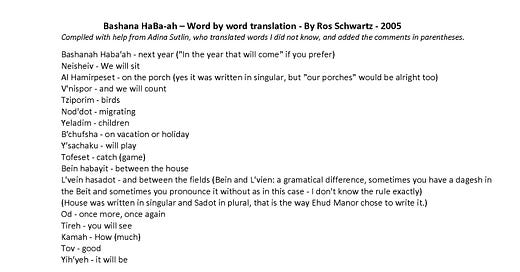My close friend Karin Montin was a translator, and we had many conversations about the nuances of translation. An expert translator does not have to know everything, but they need to know what they looking for, how to articulate their questions, and where to find the answers.
Working from French to English, Karin sometimes asked for my assistance with subtleties of medical terminology. For other technical translations she used many resources, both written and oral, to be sure that her English version matched the intention of the original. When translating books and poetry, she paid close attention to word choice, to reflect the mood as well as the meaning. On one of my visits to Montreal, she invited me to a translators' poetry slam, where each competitor showcased their own personal translation of the same poem. The variations were fascinating - my friend's (of course) was the best!
Good songwriting translation attends to meaning and mood, and also adds another element : the need to match the words to the rhythm of the music, so that the lyrics flow naturally, and (as they say) the acCENT does not fall on the wrong sylLAble. This is one component of prosody, in which every element of a song communicates the same meaning. Bonus points if you can match the sounds of the words - hard sounds like “K” and “P” vs soft sounds like “sh” and “m”, and onomatopoeia like “hiss” and “clink”. And extra bonus points if you can match the rhyme scheme of the original!
Most of my translations are from Hebrew or Yiddish to English. I always begin with a detailed word-by-word analysis. I start by writing out the lyrics, one word per line, and translating all the words that I know. Next I consult a dictionary, and/or the internet, and/or an expert, to fill in the blanks. Then I ask an expert to review the results, looking for idioms that I may have missed, and tonalities of word choice that may only be clear in a particular context.
This word-by-word study is an excellent means of extending my own vocabulary, as well an invaluable teaching tool; people retain words of a foreign language much more easily if they know what they mean.
Story time: Many years ago, an 80-year-old Israeli choir member refused his help, because he said he only wanted to sing the songs in their original Hebrew, and did not want to be a party to my feeble attempts at translation. But when he recruited a few of his non-Israeli compatriots to sing with us, he changed his tune, because he acknowledged that it would be easier for them to sing his favourite songs in their own language than to try to mumble through the unfamiliar Hebrew!
Once I know what each word means, I play with putting the English words together into sentences, trying out various versions, until I narrow the options down to a single choice for each line.
One of my friends described the outcome of this process as "Such precise work. Like a linguistic surgeon."
Like my songs, my translations are never finished. In Bashana HaBa-ah, here are a few examples of revisions in Verse 1:
"In the year that will be, we’ll sit out on our porches" became "we’ll sit upon the porch" because "mirpeset", in the Hebrew, is singular.
"Counting migrating birds as they fly" became "and count wandering birds as they fly" because “and count” is more active than “counting”, and “wandering birds” evokes the phrase "wandering Jews".
"And the children will run between the houses and the fields" became "And the children will run from the house out to the fields" because in the Hebrew "habayit" is singular, "sadot" is plural.
"Playing catch under cloudless blue skies" became "cloudless blue sky", which is a more precise rhyme with "fly".
There are subtleties to the lyrics that reveal themselves upon close inspection. For example, my sister commented that the lines “The soft wind will blow a cloud of old newspapers / bearing news that is long out of date” imply a time of peace, when people don’t need to stay alert for the latest breaking news; they can afford to let a cloud of old newspapers blow by.
Tomorrow I will post the original Hebrew lyrics, and the singable English translation!
Ros Schwartz
26 April 2025





Such a lot of time and effort. A very thoughtful and insightful study.
Thanks for sharing your fascinating & impressive approaches to translating lyrics, Ros. I will borrow them in my own future efforts!